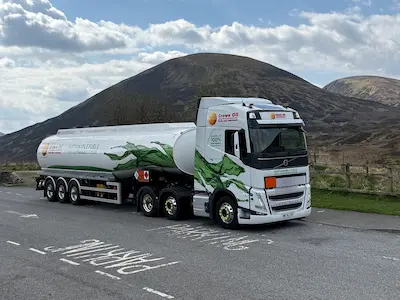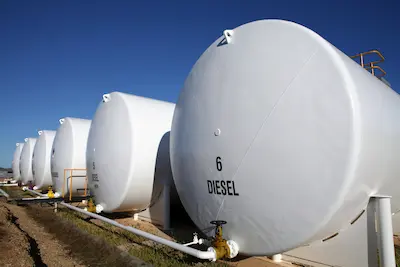Got Questions About Red Diesel Rules, Tax Changes, or Usage? We’ve Got You Covered
Our red diesel FAQs cover changes to usage, legality and taxation introduced in April 2022.
Red diesel (also known as gas oil) is chemically similar to regular diesel, but it’s dyed red to prevent unlawful use. It’s legally used by certain industries in off-road vehicles and machinery.
Whether you’re new to red diesel or affected by the tax changes, our comprehensive FAQ is here to help you navigate the rules and understand the benefits of this lower fuel-duty alternative to DERV. After all, we’ve been a trusted red diesel supplier for decades.
Still have questions or need a quote? Call our red diesel experts on 0330 123 1444 to discuss your fuel needs and get up-to-date pricing tailored to your business.

What is red diesel?
Red diesel, also known as gas oil, is a type of fuel used in off-road vehicles and machinery. Red diesel is functionally the same as white diesel; however, it has a red marker (dye) added to differentiate it from standard diesel and help prevent illegal use in road-going vehicles.
Red diesel is subject to a lower level of excise duty than white diesel, which is why it’s often called rebated fuel or rebated diesel.
Does red diesel have any other names?
Yes, red diesel is commonly known by several other names, including:
- Gas oil
- Rebated diesel
- Marked gas oil
- Cherry juice
- Cherry red
- Agricultural diesel
- 35 seconds
- Medium diesel
- Tractor diesel
- Marine diesel
All of these refer to the same fuel and have the same laws regarding their usage.
Is red diesel red?
Yes – it’s not got its name for no reason! The red dye is added to enable authorities to identify any illegal misuse, which they often do in random checks via dip testing. The dye doesn’t change the fuel’s properties in any other way.
Can the red dye be removed?
Technically, yes – but doing so is illegal. The intricacy of this process varies, and using any method to remove the red dye is known as fuel laundering and can land you with a prison sentence.
Red diesel can dye or stain the interior of your fuel tank. While harmless, this makes it easy for police officers and HMRC to detect and prosecute fuel fraud. Even if you only use red diesel once, you could be prosecuted years later due to the colour of the tank.
What is the specification of gas oil?
British Standard BS 2869 is the fuel specification that governs gas oil. There are two grades of red diesel within BS 2869 Class D and EN 590:2013.
The fuel properties are automatically adjusted ahead of the winter and summer months to maintain good low-temperature operability.
How is red diesel made?
Like most fuels, red diesel is obtained from crude oil that has been extracted from the ground. The crude oil is heated and distilled to produce gas oil; the red dye is then added to the final product to give it its distinct colour.
Are there any alternatives to red diesel?
Depending on the desired use or benefit, there are several alternatives to gas oil, including:
- Industrial heating alternative – Red diesel is no longer permitted as a commercial heating fuel, meaning users must now use white diesel. Industrial heating oil (IHO) is a direct, drop-in alternative to diesel that has been specifically made for use in commercial boilers, dryers and heaters and is prohibited for use in engines.
- Cleaner burning alternative – HVO fuel (Hydrotreated Vegetable Oil) is a direct, drop-in alternative to red diesel that can reduce up to 90% of net CO2 emissions right away and be stored for up to 10 years compared to just 1 year for fossil diesel.
How much is red diesel?
The price of red diesel changes every day due to a number of factors, including global supply, demand, world events and politics. This means we are unable to provide live red diesel prices online. Your delivery location and required quantity also affect the cost of red diesel. The more fuel you order, the lower the price per litre.
For a competitive red diesel price, call our fuel experts today on 0330 123 1444
What’s the difference between red diesel and white diesel?
Chemically, red and white diesel are the same fuel – red diesel is simply white diesel that has been dyed. However, they are used and taxed in different ways: red diesel has a lower fuel tax duty than white diesel as it’s heavily rebated and must only be used in off-road vehicles and machinery.
Can you mix red and white diesel?
No, you must not mix the two fuels. For anyone who uses both fuels (such as farmers), supplies must be kept separate, and machinery, tanks and supply lines must be flushed in between permitted and non-permitted use to remain compliant.
Is red diesel the same quality as standard diesel?
Yes, red diesel is chemically identical to standard diesel; the only differences are the red dye, the intended use and the applied rebate.
Why is red diesel cheaper than white diesel?
Rebated fuel (red diesel) is cheaper than white diesel (DERV) because of a lower fuel tax duty applied to it.
The permitted uses for red diesel are restricted to certain industries. To enable them to make a profit, it’s essential that certain duties can be reclaimed, and this includes red diesel fuel.
Who can use red diesel?
Since April 2022, red diesel use has been restricted to the following industries:
- Travelling fairs and circuses
- Fuel used for non-commercial purposes – electricity generation and heating
- Agriculture, horticulture, fish farming and forestry
- Rail transport
- Community amateur sport clubs and golf courses
- Sailing, boating and marine transport (excluding private pleasure craft in Northern Ireland)
Removing the red diesel entitlement for most sectors was intended to incentivise users to move to cleaner alternative sources as part of its net-zero drive.
For more details, visit HMRC’s website.
Is red diesel illegal?
Red diesel isn’t illegal if used in off-road machinery and vehicles. There are a few exceptions to this, i.e. tractors can use red diesel for gritting public roads and when crossing a public road from one field to another.
Any use of red diesel in a road vehicle on a public highway is illegal, as it’s considered tax evasion. You can find more details on the gov.uk website.
Which vehicles can use red diesel?
Technically, all diesel-powered vehicles can run on red diesel. However, should you use red diesel in a road vehicle, it is considered tax evasion and therefore breaking the law.
Can red diesel be used in cars?
Red diesel is no different to regular white diesel; it has the same properties, so it can power all diesel-powered engines. However, if you use red diesel in a road vehicle on public roads, it’s considered tax evasion, and you will be breaking the law.
An exception to this is for farmers. They can travel up to 1.5km using red diesel in a car or other road-going vehicle to access land on the public highway.
Will red diesel damage my car?
No, red diesel is the same fuel as road diesel, but the red dye will stain your tank, making it extremely difficult to remove all traces.
What are the penalties of using red diesel illegally?
Penalties for misusing red diesel can include:
- Potential criminal charges in severe cases
- Fines for the restoration of your vehicle’s system and the cleaning of your tank and filters to remove the marker dye
- Seizure of vehicles
- Requirement to pay back the tax difference
Can tractors use red diesel on public roads?
Tractors can use red diesel on public roads for agricultural purposes only, such as travelling from land parcels owned by the same farm. They must not use red diesel for any non-agricultural road transport activities, and there is a limit on the distance that can be travelled (1.5km). Another exemption is when gritting public roads.
Can I run my car on red diesel if I only use it on a farm?
As long as the vehicle is only used for off-road, farm-related activity, then you will be permitted to use red diesel.
What happens if I put red diesel in my car by accident?
We would recommend, if possible, draining your car’s engine as soon as possible. The issue is that the red marker will remain in your tank once the red diesel is removed – therefore, we would always recommend speaking to HMRC or a fuel company.
Can I use gas oil and white diesel in separate tanks on my tractor?
No, as it’s illegal to have two different tanks which can connect to your engine and carry red diesel and white diesel or separate fuels.
Can you run backup generators on red diesel?
The rules surrounding red diesel use in backup generators changed in April 2022, resulting in commercial generators losing access to the rebated fuel. white diesel, or a cleaner-burning alternative called HVO fuel.
Will my boiler be able to burn red diesel to heat my home?
This depends on the make and model of your furnace. A rule of thumb is that if your boiler is vertically conventional fluid, then you will be able to use gas oil to heat your home.
Can red diesel be used in a pleasure craft?
Yes, red diesel can be used for heating and powering a pleasure craft within UK waters.
Diesel used for propelling private pleasure craft can no longer benefit from a reduced rate of duty – it’s subject to duty at the full rate.
Where can I buy red diesel for my boat?
When purchasing red diesel for your boat, you need proof of its intended use, such as a VAT certificate or letter from a boating club to demonstrate to the fuel supplier that it’s for onboard use only.
Red diesel continues to be available in marinas across the UK, but recreational boaters must pay the full rate of duty when purchasing fuel for the purposes of propulsion. Red diesel used for domestic purposes, such as heating or electricity generation, can be purchased at the reduced rate of duty.
Recreational sailors who buy diesel for their vessel must declare to the supplier if they intend the fuel to be used for propelling a private pleasure craft. You must also declare what percentage of the fuel will be used for propulsion (as opposed to domestic purposes such as heating or electricity generation).
Crown Oil supplies red diesel for boats across the UK. Call 0330 123 1444 for a competitive quote.
What are the laws, regulations and rules regarding the storage of red diesel on a farm?
When it comes to storing oil safely and effectively, every situation is different. For this reason, the following recommendations should only be understood as a general guideline, and a proper site survey should be conducted to determine your specific needs.
General oil storage requirements – This includes having a structurally sound storage tank. Other items required include drip trays, pumps, and ancillary equipment. The integrity of both tanks and ancillary products must be of a high standard and unlikely to leak or burst.
Structural integrity and maintenance of primary storage – A storage tank for red diesel should last around 20 years. However, it must also be maintained every year to prevent unwanted leaks and pollution. The tank must have an impermeable bund base and walls. Regular maintenance by a professional inspector will reduce the chances of small issues developing into significant problems and help avoid costly damage to you and the environment.
Safety zone and maintenance recommendations – If you own a fuel storage tank, then it’s advisable, where possible, to position it away from any areas which could facilitate the pollution of the environment. It is therefore advised not to build your tank outside of a building within 50 meters of a borehole or 10 meters from inland and coastal waters.
To read more about this topic, view DEFRA’s guidance.
Is red diesel exempt from tax?
Unfortunately, not, although it’s a heavily rebated fuel, which means the tax is much lower than other fuels. If you lost access to the rebated fuel in April 2022, you will need to purchase white diesel or a cleaner alternative such as white HVO.
What is the tax on red diesel?
Red diesel has a lower tax rate than regular diesel, but it’s still subject to value-added tax (VAT) and fuel duty.
Read our guide on the tax changes on red diesel that came into effect from April 2022.
How do you reclaim the tax on red diesel?
You should keep accurate records of all fuels you have purchased to demonstrate that you haven’t been stockpiling and that you have started the transition to non-rebated fuels.
HMRC will take a pragmatic approach to all cases. As long as you have invoices/receipts to prove you have moved over to full duty fuel, they will be more mindful of companies and individuals continuing to use red diesel illegally.
Do you require a licence to buy red diesel?
No, you do not need a licence to buy gas oil, but you will need to sign an RDCO form. However, the company selling red diesel or any other controlled oils (rebated bio blend, kerosene and aviation turbine fuel) must be registered with HMRC.
It is the responsibility of the dealer of controlled oils to make sure the fuel is being used legitimately, and they may pass on details about the transactions to HMRC, which can be further used by the Road Fuel Testing Units (RFTU).
Where can I buy red diesel from?
Red diesel isn’t typically available from the vast majority of petrol stations, especially in town and city locations.
However, here at Crown Oil, we can supply you with red diesel all across the UK from our nationwide network of fuel depots, within 24-48 hours of purchase.
If you’d like to call our fuel experts to discuss you rrequirements, or request a quote. You can do so by calling us on tel% today.
Where can I buy red diesel barrels?
If you use a small amount of red diesel or you don’t have a permanent on-site oil storage tank, then buying red diesel by the barrel or drum may be a preferable option for you.
Crown Oil supplies 205-litre oil drums of red diesel with national delivery at competitive prices.
What can I do with my unwanted red diesel?
Removing any surplus/unwanted fuel from your tank(s) can lead to potential risks to the environment if not carried out by a professional company.
Leaving red diesel, which is no longer needed, can also pose further potential hazards over time.
Our team of engineers is fully accredited and can uplift and remove unwanted gas oil with minimal disruption. Depending on its condition and quantity, you may even receive payment for the fuel.
Learn more about our fuel uplift services.
If you have any questions about our red diesel, call our experts today on 0330 123 1444. We’ll be happy to discuss your requirements and answer any additional questions about red diesel, along with our other fuels and services.







